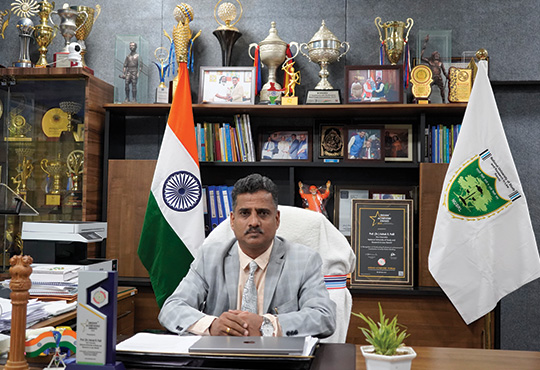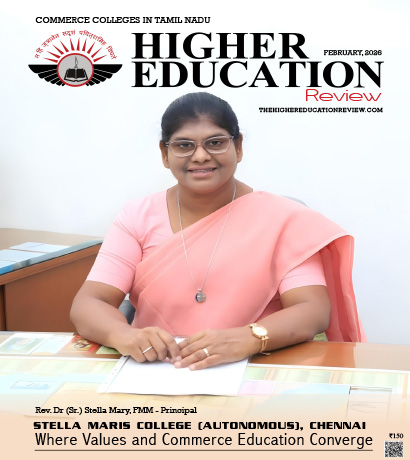Emerging Career Paths for Indian Law Graduates
 Ashok R. Patil, Vice Chancellor, National University of Study and Research in Law in an interaction with the Higher Education Review shared his views on what skills and knowledge areas make graduates more attractive to top corporate law firms in India, how important are internships and clerkships at Tier-1 law firms for securing pre-placement offers, how students build expertise in mergers & acquisitions, banking, and securities law to stay industry-ready and more.
Ashok R. Patil, Vice Chancellor, National University of Study and Research in Law in an interaction with the Higher Education Review shared his views on what skills and knowledge areas make graduates more attractive to top corporate law firms in India, how important are internships and clerkships at Tier-1 law firms for securing pre-placement offers, how students build expertise in mergers & acquisitions, banking, and securities law to stay industry-ready and more.
What specific skills and knowledge areas make graduates more attractive to top corporate law firms in India?
The most critical skills that make law graduates attractive to leading corporate law firms in India are legal research and drafting. Since corporate law firms primarily function through in-office operations rather than direct litigation, proficiency in these areas is indispensable. Graduates must also possess a sound understanding of legislative frameworks and jurisdictional nuances, as complex corporate research often involves cross-jurisdictional analysis and interpretation of multiple statutes. The ability to synthesize legal materials, draft precise documents, and interpret statutory provisions efficiently greatly enhances employability in top-tier firms.
How important are internships and clerkships at Tier-1 law firms for securing pre-placement offers (PPOs)?
Internships and clerkships at Tier-1 law firms are pivotal for securing pre-placement offers. They allow recruiters to evaluate a candidate’s skills, work ethic, and adaptability in a real-world setting over an extended period. Prior exposure to reputed law firms also provides students with practical insights into corporate operations and demonstrates their familiarity with professional environments. Consequently, a strong record of internships across diverse practice areas often helps candidates stand out and enhances their likelihood of receiving PPOs.
How can students build expertise in mergers & acquisitions, banking, and securities law to stay industry-ready?
To build expertise in specialized areas such as Mergers & Acquisitions (M&A), banking, and securities law, students must stay abreast of recent regulatory developments, judicial decisions, and policy notifications. Regular reading of financial newspapers, SEBI circulars, and RBI notifications, combined with consistent review of case law, is essential. Furthermore, targeted internships at boutique or mid-sized firms practicing in these domains can provide valuable practical exposure. Developing both theoretical and hands-on understanding ensures that students remain industry-ready and relevant to contemporary corporate practice.
How can law students prepare for a successful litigation career, given the long gestation period in practice? What are the best strategies to balance judiciary exam preparation with ongoing law school commitments?
Litigation offers a career path distinct from corporate practice, requiring consistent courtroom exposure and procedural knowledge. Aspiring litigators should begin early by interning with litigation chambers to gain first-hand experience in drafting, research, client interaction, and court procedure. This early training helps them transition smoothly into practice post-graduation, allowing them to focus on developing a client base and honing advocacy skills.
To balance judiciary exam preparation with law school commitments, students should focus on academic excellence and conceptual clarity, as most exam syllabi are derived from core subjects taught in law school. Regular answer-writing practice, familiarity with previous years’ papers, and mentorship from faculty or judicial officers are equally important. Since three years of practice are mandatory before appearing for judicial services, students can utilize that period to deepen their understanding of procedural and substantive law while refining their writing and presentation skills.
What career opportunities exist in technology law (data privacy, AI regulation, cybersecurity)?
Technology law is an emerging and rapidly expanding field, encompassing areas such as data protection, AI governance, and cybersecurity regulation. With increased governmental and private sector focus on technological innovation, legal expertise in data management, compliance, and digital risk assessment is in high demand. Graduates can pursue careers as technology law associates in corporate firms, litigation lawyers specializing in cyber disputes, or in-house counsels for tech companies. This sector promises dynamic opportunities, particularly as India’s digital economy continues to evolve.
What are the prospects in sports law, entertainment law, and fashion law for students interested in non-traditional fields?
Sports law, entertainment law, and fashion law are niche and evolving sectors within the Indian legal landscape. These fields often intersect with intellectual property rights (IPR), media regulations, and consumer protection laws. Currently, most opportunities are concentrated in metropolitan cities like Mumbai and Delhi. Students seeking to enter these areas are advised to join TMT (Technology, Media, and Telecommunications) or IPR teams of law firms, or to pursue in-house roles within companies operating in these industries. As these fields mature, they are expected to offer broader avenues for specialized legal practice.
How can students position themselves for careers in public policy and regulatory advisory roles?
Careers in public policy and regulatory advisory demand a strong understanding of governance, economics, and legal reform processes. Students aspiring for such roles should actively engage with think tanks, research foundations, and policy institutions such as Observer Research Foundation (ORF) or Vidhi Centre for Legal Policy. Interning with government bodies, NGOs, and advocacy organizations can also provide exposure to policymaking and legislative drafting, building a foundation for a long-term career in this field.
How valuable are foreign LL.M. programs (US, UK, EU) for career progression, and how should students prepare for them? How does international commercial arbitration open global career avenues for Indian law graduates?
Pursuing a foreign LL.M. can be valuable, particularly for those inclined towards academia, international practice, or policy research. However, its true benefit lies in combining it with prior professional experience. Students who complete LL.M. programs immediately after graduation may still be viewed as freshers in the job market. Therefore, gaining practical exposure before pursuing an LL.M. is recommended.
International commercial arbitration (ICA) offers Indian graduates a global career platform, aligning them with international legal standards and practices. It opens avenues for cross-border dispute resolution, enhances global networking, and enables practitioners to engage with clients and arbitral institutions across jurisdictions.
How can law graduates leverage their training to become legal entrepreneurs or start-up founders (legal-tech, compliance, consulting)?
Legal entrepreneurship demands a balance of legal acumen and business versatility. Aspiring entrepreneurs must be “jack of all trades and master of one,” possessing multidisciplinary skills ranging from legal expertise to marketing, operations, and management. Understanding technology, finance, and communication is essential for establishing ventures such as multidisciplinary skills, compliance consultancies, or contract management services. By blending legal knowledge with innovation and strategic thinking, graduates can create sustainable and impactful enterprises within the legal ecosystem.
What opportunities exist in in-house counsel roles at startups, MNCs, and PSU companies?
In-house counsel roles primarily revolve around contract vetting, legal compliance, risk assessment, and documentation. Professionals in these roles act as internal legal advisors, managing regulatory obligations and ensuring the organization’s adherence to applicable laws. They draft and review agreements, handle legal notices, and coordinate with external counsels when necessary. However, since these positions do not involve representing clients before courts, the counsel operates as an employee rather than as an advocate. In-house positions in startups, multinational corporations, and public sector undertakings offer stability and direct business exposure.
How can a law graduate transition into corporate strategy, compliance, or risk management careers?
Transitioning into corporate strategy, compliance, or risk management requires specialized internships and professional certifications. Law graduates can begin by working with small firms or startups focused on compliance and regulatory advisory to gain foundational experience. Building domain expertise in corporate governance, due diligence, and financial regulation helps position candidates for roles that bridge law and business. Over time, practical experience in compliance and risk analysis can lead to senior roles in corporate advisory, strategy, or compliance departments.
How can students stand out in interviews with case law-based reasoning and commercial awareness?
To excel in interviews, students must exhibit clarity of thought, analytical reasoning, and awareness of current legal and commercial trends. A firm grasp of the matters mentioned in one’s résumé is essential. Candidates should be able to discuss case laws, recent judgments, and developments in their areas of interest with precision and insight. Demonstrating commercial awareness by understanding how legal developments affect industries and businesses adds significant value. Moreover, showcasing a coachability mindset, engaging in conversational yet structured dialogue, and reflecting confidence and curiosity often leave a lasting impression on interviewers.
About the author:
Prof. (Dr.) Ashok Ramappa Patil is the Vice Chancellor of NUSRL Ranchi and a distinguished academic with over 27 years of teaching and administrative experience. Dr. Patil is currently the Vice-Chancellor of the National University of Study and Research in Law (NUSRL), Ranchi, Jharkhand, a position he has held since June 2023. An eminent scholar, legal expert, and visionary administrator, Prof. Patil's exemplary contribution spans over two decades in legal education, policy advocacy, consumer protection, and tobacco control

